
Battlefield 2042's combat doesn't feel right. Anyone who played the game for any length of time could easily see that, but it's not always clear why that's the case.
Since the game's release, players have been dissecting its various gunplay mechanics to try and understand what's causing gunfights to feel inconsistent. This has lead to the discovery of mismatched hitboxes on some Specialists, and the now-infamous bullet spread - the latter of which has been heavily adjusted in this week's patch.
The final element of that formula is Battlefield 2042's hit registration, which is affected by a number of factors, chiefly server connection, tickrate, ping, packet loss, and how the game handles data (netcode).
Battlefield games have historically suffered from major netcode problems at launch, but it appears the push for 128 players and bigger maps have taken things a few steps further. Though many who play Battlefield 2042 regularly have felt this, no one has really done any testing - until today.
YouTuber Jackfrags came up with this simple experiment to try and replicate the poor hit registration we all get in live multiplayer games. To do this, he set up a server with AI bots, and chose the area on the roof of the C1 building on Kaleidoscope Breakthrough because it can cram together a large number of players - perfect for replicating the busy points in normal multiplayer (and a good weapon XP farming spot).
As you can see in the video, it quickly becomes clear that the game just ignores some of the bullets fired and doesn't register some hits, even though you can see the enemy 3D model reflect getting shot through flinch and blood splatter.
Jackfrags has a 10ms ping to the server, and there doesn't appear to be any packet loss problems or any other network hiccups that could cause bullets not to register. This appears to get worse the more data the game tries to process, such as explosions kicking up dust and generating particle effects, items being airdropped - basically anything that contributes to the chaos in a small area. The test was performed with various weapons, and in other maps.
Traditionally, netcode problems of this nature take a long time to fix. It took nearly a year for them to be acceptable in Battlefield 4, and a few months of patches in Battlefield 1. Of course, those games did not have to contend with 128 players, advanced physics simulation and large maps - so we'll have to see how much better this could get.
Battlefield 2042 is due to receive its most substantial patch so far sometime next week, though it’s not clear if we can expect netcode fixes to be included in that.
ncG1vNJzZmivp6x7t7ORbW5nm5%2BifKOt062jnp6ZmrmleZFpa2tlkqe8rLHNZp%2BirF2nsqi10q2pmqyZpLtuuMCrnp5loKGuurHRZqWupZKav7R5zZ6rnKeUmg%3D%3D